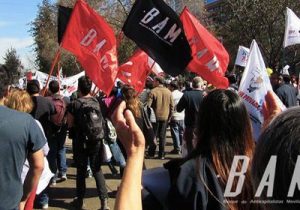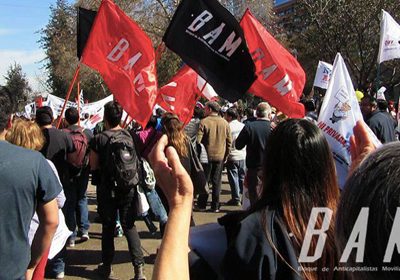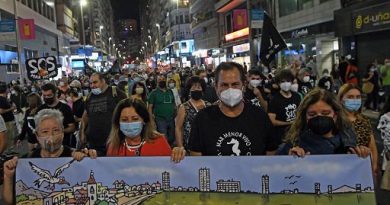Charting ecosocialistas bridges
Starting the year we face a new right-wing government, the Pinera. It will show a more conservative face in a worn model that has found massive street response. Senior managers of neoliberalism are in decline, expressing the exhaustion of a system that leads to social boundaries and natural. All this talk and exchange ideas with Mariano Rosa, Ecosocialist coordinator of the Network of Argentina. Tranzando a leaf of common route of global convergence, from protest to proposal.
Pinochet's legacy, transition and new period
Chile in recent years has been expressing a crisis of consensus democracy, legacy of the dictatorship, which she began to show its cracks with the emergence of the student movement in the 2006-2011, period expressed the contradictions of the majority of students with market logic, tuning the enormous social protection that promotes neoliberalism. The economic-social reorganization that began with the military terror involved an orientation to privatization and denationalization of the economy, that deep counter implemented with blood and fire, It had a normalization process under the ideology "Chicago boy" supported by the governments of the Concertación, which under its first mandate he was overturned in implementing the Agenda privatista, It is time to deepen the monopolization. One thing is the evolution of the private sectors in the field of drinking water, the late 80 'projected a 3%, while during the government of Eduardo Frei (1998), the General Health Services Act was amended, resulting in the 2005 will result in 95%.
The dynamics of the post-dictatorship years has been strongly questioned by hikes mobilizations, the momentum of 2011 it conditioned the political regime a process of disaffection with mainstream society. Thus the second government of Bachelet, where he included the Communist Party to the New Majority, tries to take the main demands and transform it into a package of reforms within the margins of neoliberalism, failing to resolve the contradictions latent. On education 28% only access a grant of "gratuity", whereas the draft Constitutional Reform, simulacrum acted as "public consultations" and against the massive mobilizations for a new pension system, the proposal was for a State AFP, ie a makeup that sought to support the system with reforms to capital Painless. This ended up becoming one of the factors of the crisis the project of the New Majority, adding to the crisis is crossed conclude corruption cases in the last elections as the biggest defeated.
The right won in the main reference framework of government in recent years entered a terminal crisis stage, looking back together in an open to bipartisanship period. The last elections showed the urgency of a new political-electoral phenomenon as a symptom of wear process of the previous step, Thus emerged the Frente Amplio primarily by student movements, mark achieved in the first round surprise, with a 20% Beatriz Sánchez, very close to the 23% Guiller and achieving 20 deputies and one senator elected. The conglomerate is claimed "neither left nor right" that channeled discontent against "old" and search for the new with a speech renewal.
Extractivismo laboratory and resistors
In recent decades Latin America has been responsible for the global division exporter large-scale role of primary goods, at the expense of territorial dispossession and social dispossession. This overall strategy involves reorganizing capital control and disposal of natural resources to ensure the dynamics of accumulation, having free access thanks to the commodification and financial speculation on the territory. Chile from the perpetuation of the Pinochet legacy has come to be a laboratory of counter, It is set to the current phase of extractivismo amid triumphant neoliberalism, ie being one of the most extranjerizadas economies worldwide.
Private logic and state deregulation are based on a legal framework protected in the Constitution of Pinochet. In the mining case Pilar key- the Constitutional Organic Law on Mining Concessions and Mining Code and Regulations, both of 1983, Indefinite apply concessions for exploration and exploitation, engendering a political-corporate power in the transfer of charges between CEOS ministers, under the eaves of a round business. Other examples are the case of Forestry, supported in the D.L. 701: Forest Development Act, what in 1974 subsidizes private even in their 90%, with tax benefit for the exploitation of exotic species in large tracts of land under monoculture.
The Water Code established (1981), nourishes and protects constitutional guarantees private property rights water, thus the Code applies two water rights based on use, final y no final, the first applied to waters that can not be reused, ie mining, farming, among other activities. The dimension of this legal obstacle has allowed the state institution responsible for water management -the Directorate General of Water- grant private resource use free of charge and in perpetuity. The consequences of the loss of sovereignty water leads to concentration of ownership of water in large economic groups, expressed in the 90% non-consumptive are owned by foreign companies: Endesa, Aes-Gener and Colbun. Another factor already mentioned are the use of drinking water.
To protest, propose: anticapitalist and ecosocialista sheet path.
The month of January we share with Mariano Rosa, Ecosocialist coordinator of the Network of Argentina, where we perform two activities focused on building bridges between social and environmental experiences of struggle and ask purposive way the challenges of moving from resistance to the proposal. The first we carry forward with the Water and Sovereignty Assembly Puente Alto, where we do organic part as BAM, this time in a public square, between music and dialogues, the spokesmen of the assembly raised the leadership role it has taken Water and sovereignty as opposed to Alto Maipo hydroelectric project that threatens the main water source of drinking water throughout the metropolitan region, meanwhile our colleague Mariano emphasized the need for a political project that tended bridges continental level to front extractivismo.
We think necessary and possible new horizons, so has returned to exemplify a world where women, trabajadorxs youth and become a protagonist in stopping attempts of capitalism in its offensive raise over the 99% population. Social mobilization is instrumental in dismantling the power of 1%, however we need to move from resistance to the proposal, to build a purposeful political and social force, aware, rebellious and non-dogmatic, bold enough to take heaven by assault. That is our roadmap, Anticapitalista, Feminist and Ecosocialist. In this way we intend to build as BAM and Ecosocialist Network, in our country and across the continent, thus the experience and agreements that we discussed these days with the MST and Red, propositional voices are. A Multiplicarlas.
Joaquín Araneda, Mobilized Anticapitalista block - Red Ecosocialist.




